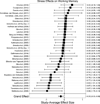The effects of acute stress on core executive functions: A meta-analysis and comparison with cortisol
- PMID: 27371161
- PMCID: PMC5003767
- DOI: 10.1016/j.neubiorev.2016.06.038
The effects of acute stress on core executive functions: A meta-analysis and comparison with cortisol
Abstract
Core executive functions such as working memory, inhibition, and cognitive flexibility are integral to daily life. A growing body of research has suggested that acute stress may impair core executive functions. However, there are a number of inconsistencies in the literature, leading to uncertainty about how or even if acute stress influences core executive functions. We addressed this by conducting a meta-analysis of acute stress effects on working memory, inhibition, and cognitive flexibility. We found that stress impaired working memory and cognitive flexibility, whereas it had nuanced effects on inhibition. Many of these effects were moderated by other variables, such as sex. In addition, we compared effects of acute stress on core executive functions to effects of cortisol administration and found some striking differences. Our findings indicate that stress works through mechanisms aside from or in addition to cortisol to produce a state characterized by more reactive processing of salient stimuli but greater control over actions. We conclude by highlighting some important future directions for stress and executive function research.
Keywords: Acute stress; Cognitive control; Cognitive flexibility; Cortisol; Executive function; Inhibition; Interference control; Meta-analysis; Response inhibition; Set shifting; Working memory.
Copyright © 2016 Elsevier Ltd. All rights reserved.
Figures








Comment in
-
Commentary: The effects of acute stress on core executive functions: A meta-analysis and comparison with cortisol.Front Psychol. 2017 Sep 28;8:1711. doi: 10.3389/fpsyg.2017.01711. eCollection 2017. Front Psychol. 2017. PMID: 29033882 Free PMC article. No abstract available.
-
Balancing precision with inclusivity in meta-analyses: A response to Roos and colleagues (2017).Neurosci Biobehav Rev. 2018 Jan;84:193-197. doi: 10.1016/j.neubiorev.2017.11.013. Epub 2017 Nov 22. Neurosci Biobehav Rev. 2018. PMID: 29175305
References
-
- Alexander JK, Hillier A, Smith RM, Tivarus ME, Beversdorf DQ. Beta-adrenergic modulation of cognitive flexibility during stress. J. Cogn. Neurosci. 2007;19:468–478. - PubMed
-
- Allen AP, Kennedy PJ, Cryan JF, Dinan TG, Clarke G. Biological and psychological markers of stress in humans: Focus on the Trier Social Stress Test. Neurosci. Biobehav. Rev. 2014;38:94–124. - PubMed
-
- Borenstein M, Hedges LV, Higgins JPT, Rothstein HR. Introduction to Meta-Analysis. Chichester, UK: John Wiley & Sons, Ltd; 2009.
Publication types
MeSH terms
Substances
Grants and funding
LinkOut - more resources
Full Text Sources
Other Literature Sources
Medical

